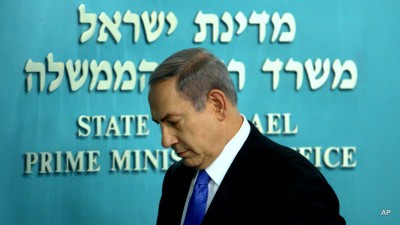Netanyahu Has A Twitter Meltdown Over Iran Nuclear Deal

Image: Israeli Prime Minister Benjamin Netanyahu walks out following a press conference at his Jerusalem office on Tuesday, July 14, 2015. The nuclear deal with Iran could strike a heavy personal blow to Netanyahu, leaving him at odds with the international community and with few options for scuttling an agreement he has spent years trying to prevent.
Despite approval by global nuclear experts, Netanyahu continues to sing the same old tune about the Iran deal, 140 characters at a time.
WASHINGTON — As Washington and Iran celebrated a nuclear deal that many see as a historic step forward for relations between both countries, Israeli Prime Minister Benjamin Netanyahu took to social media to repeat what’s becoming an increasingly tired refrain: that peace with Iran spells impending doom for Israel and will lead to widespread suffering in the Middle East.
On Tuesday, world leaders reached an agreement that brings an end to lengthy negotiations with Iran over its controversial nuclear program. The deal seeks to limit Iran’s ability to produce a nuclear bomb for at least the next 15 years while still allowing the country to continue low-level enrichment necessary for nuclear power generation. To uphold the agreement, international inspectors would have increased, but not unlimited, access to Iranian nuclear facilities. In return, Iranians can look forward to a gradual easing of sanctions that have had a brutal effect on their economy.
While Iranians celebrated the deal, Netanyahu took it as an opportunity to repeat a militaristic message that’s been Israel’s main talking point since before the prime minister’s controversial speech to Congress.
PM Netanyahu: “The world is a much more dangerous place today than it was yesterday.” https://t.co/nfXmEam0A7
— PM of Israel (@IsraeliPM) July 14, 2015
“The world is a much more dangerous place today than it was yesterday,” begins Netanyahu’s statement on the Iran deal, released on YouTube by Israel’s Government Press Office, and then widely repeated on social media channels, like Twitter’s @IsraeliPM. In the statement that follows, and his related postings on Twitter, Netanyahu offers little evidence that the deal poses any real threat, but plenty of ominous sounding rhetoric about the dangers of Israel being wiped from the face of the earth.
PM: The leading international powers have bet our collective future on a deal with the foremost sponsor of international terrorism.» — PM of Israel (@IsraeliPM) July 14, 2015
Netanyahu calls Iran the “foremost sponsor of terrorism” in the Middle East, but his own country doesn’t have the cleanest track record when it comes to actions that perpetuate regional destabilization. Further, the United States, which many global citizens agree poses the greatest threat to world peace, offers Israel over $3 billion in funding annually, allowing it to slaughter thousands of Palestinians during last summer’s Gaza bombing campaign while secretly assisting the Nusra Front, an al-Qaida affiliate operating in Syria.
The deal will reward Iran with hundreds of billions of dollars which will fuel its terrorism worldwide and its efforts to destroy Israel. » — PM of Israel (@IsraeliPM) July 14, 2015
Netanyahu warned that loosening sanctions would give Iran “hundreds of billions of dollars to fuel terrorism worldwide and its efforts to destroy Israel.” Other, calmer analysts suggest that while relief from sanctions could provide much needed financial liquidity to the struggling country, relief for Iran will come slowly at best. “[E]xperts familiar with the demanding verification requirements to ensure Iran doesn’t develop the ability to build nuclear weapons warn that relief won’t be felt for months and likely not until well into 2016,” the Los Angeles Times reported on Wednesday. And Eric Draiser of StopImperialism.org told Iran’s PressTV that the deal actually benefits American interests most by making Iran an ally in potential economic warfare against Russia and China.
In a decade this deal will give an unreformed, unrepentant and far richer terrorist regime a nuclear arsenal with the means to deliver it.» — PM of Israel (@IsraeliPM) July 14, 2015
Netanyahu claims that under the deal, Iran could begin building a nuclear bomb in 10 years. Not only didIsrael’s own intelligence agency discredit the claim that Iran seeks a nuclear bomb, there are much more immediate nuclear threats to the region: Israel itself possesses nuclear weapons, and Israel’s American allies ensure that the region remains unstable.
As Steve Chovanec pointed out in February on MyMPN, the MintPress News blog, an unclassified Department of Defense threat assessment report suggests Iran has neither the ability nor the intention to wage war on Israel or anyone else in the region. A month before that, Matt Peppe argued on MyMPN that Israel’s nuclear capabilities are the real threat to regional stability and nonproliferation. Every effort by the United Nations to pass a nuclear disarmament agreement for the Middle East and North Africa is ultimately sunk when the U.S. insists Israel’s nuclear weapons must be exempt.
“For countries that support the U.S. government’s self-professed right to rule the world,” Peppe concluded, “there is no danger to peace or to the survival of civilization itself that Washington will not tolerate and enable.”

